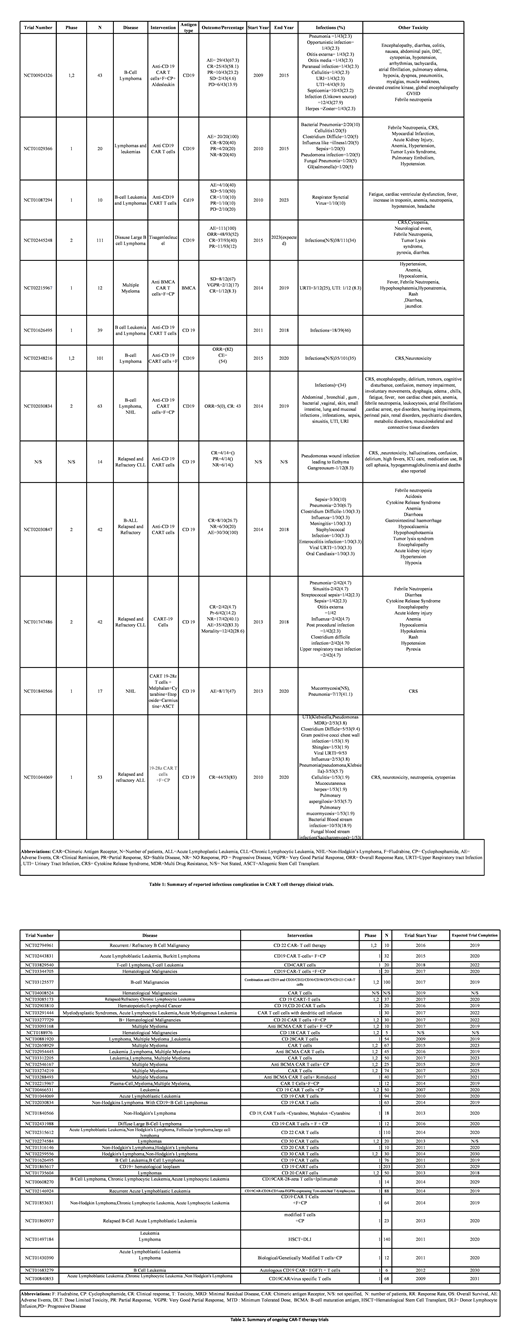Introduction:
Chimeric antigen receptor t cells (CAR T) therapy is an innovative adoptive immunotherapy being used for the treatment of CD19+ive B cell hematological malignancies, especially B cell acute lymphoblastic leukemia (B-ALL), non-Hodgkin's lymphomas (NHL) and chronic lymphocytic Leukemia (CLL). This treatment holds the potential to be highly effective and potentially less toxic alternative to cytotoxic chemotherapy for patients with relapsed and refractory (R/R) disease.This therapeutic modality is associated with a variety of side effects which includes cytokine release syndrome (CRS), neurotoxicity, B cell aplasia, hypogammaglobulinemia and resultant high risk infections. There is paucity of data about infection related complications with CAR-T therapy. In this review, we focus on the infections associated with B cell targeting CART cell therapy for the treatment of hematological malignancies.
Methods:
We conducted a systematic review (following PRISMA guidelines) by completing a comprehensive PubMed, Cochrane Library and ClinicalTrials.gov search on May 15th2019. Our search strategy included using search and MeSH terms related to CAR T therapy, hematological malignancies, Infections, safety and mortality. We were able to identify 279 articles from PubMed, 26 from Cochrane, 5 from Clinical Trials.org and 7 from Web of Science. After screening we selected 13 prospective published trials (n=555) for data extraction. We manually extracted data and summarized our results.
RESULTS:
Total included trials were 13, and trial level data from 555 patient was summarized in Table 1. Commonly used targets were CD19 ( B cell malignancies), and BCMA (Multiple Myeloma). CAR T were used for the treatment of diseases B-cell acute lymphoblastic leukemia ( ALL), B cell NHL, CLL, and Multiple myeloma (MM). Out of the available data, the two most frequent infections were upper respiratory tract infections (RTI) and blood stream infections. Other infections observed were the lower RTI, urinary tract infections (UTI), clostridium difficile (C. Diff), meningitis, mucocutaneous herpes infections, cellulitis, mucormycosis, and aspergillosis.
A Phase 1/2 trial (NCT00924326 / B-NHL / CD19 Target) demonstrated 43 cases of septicemia (23.2%), 4 cases of UTI (9.3%) and 1 case each of cellulitis (2.3%), opportunistic infections (2.3%), upper RTI and lower RTI (2.3%). Phase 1 trial (NCT01029366 / B lymphoma, leukemia / CD19 target / n=20) showed 3 cases (15%) of pneumonia, 1 case each of C Diff, Pseudomonas and salmonella (5%) infections. A Phase 2 trial (NCT02030834, B NHL, CD19 target, n=63) treated patients showed 34% patients experienced infection which included sepsis, UTI, upper and lower RTI, skin, small intestine and mucosal infections. A phase 1 trial ( NCT01840566, n=17, NHL, CD19 target) demonstrated cases of mucormycosis ( n=unknown) and 7 case of pneumonia (41.1%).
In phase 2 trial (NCT02030847, B ALL, CD19, n=30) treated patients experienced cases of sepsis (10%), Pneumonia (6.7%) and 1 case each of oral Candidiasis, C Diff, influenza and meningitis (10%). A phase 1 trial (NCT01044069, n=53, RR ALL, CD19 target) showed incidence of 11 cases of blood stream infections (20.1%), 9 cases of upper RTI (16.9), 2 cases of UTI (3.8%), 2 cases of pneumonia (3.8%), 3 cases of pulmonary aspergillosis (5.7%) and a case of herpes infection (1.9).
Phase 2 trial (NCT01747486, CLL, CD19, n=42) demonstrated 2 cases of sepsis (4.7%), 2 cases of influenza (4.7), 3 cases of upper respiratory tract infections (7.1%) and 2 cases of pneumonia (4.7%). NCT02215967, Phase 1 trial ( Multiple Myeloma, BCMA target, n=12) was associated with 3 cases of upper RTI (25%) and 1 case of UTI (8.3%). Table 2 summarizes additional ongoing CAR T cell trials.
Conclusion:
CAR T cell therapy is gaining popularity and its indications are expanding. Its complications need to be closely studied for potential infections amongst other side effects. Clinical trial results have likely under-reported infections associated with CAR-T therapy because of overlapping presentation with cytokine release syndrome (CRS), neurotoxicity and limited follow-up reported in the published trials. Additional studies with longer follow up duration are required to identify the true risk of infectious complications of CAR T therapy in patients with hematological malignancies. Real word data on CAr T patients can also reveal long term infectious complications.
Anwer:In-Cyte: Speakers Bureau; Seattle Genetics: Membership on an entity's Board of Directors or advisory committees.
CAR-T therapy. We are summarizing infectious complications of CAR-T therapy and their projects under development.
Author notes
Asterisk with author names denotes non-ASH members.


